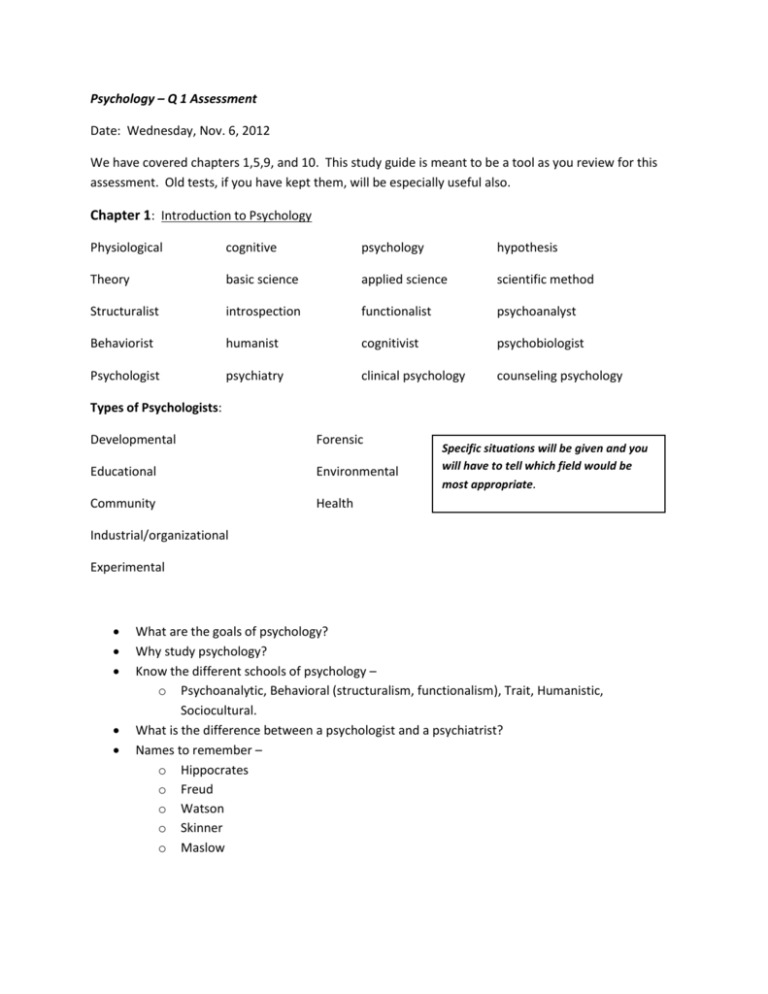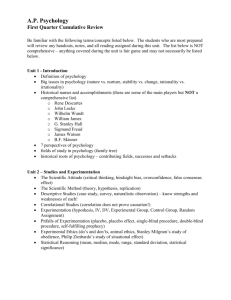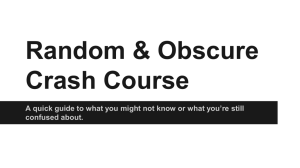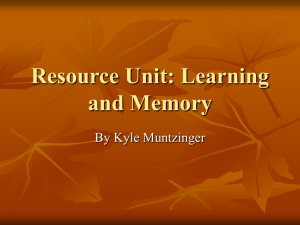Psychology – Q 1 Assessment Date: Wednesday, Nov. 6, 2012 We
advertisement

Psychology – Q 1 Assessment Date: Wednesday, Nov. 6, 2012 We have covered chapters 1,5,9, and 10. This study guide is meant to be a tool as you review for this assessment. Old tests, if you have kept them, will be especially useful also. Chapter 1: Introduction to Psychology Physiological cognitive psychology hypothesis Theory basic science applied science scientific method Structuralist introspection functionalist psychoanalyst Behaviorist humanist cognitivist psychobiologist Psychologist psychiatry clinical psychology counseling psychology Types of Psychologists: Developmental Forensic Educational Environmental Community Health Specific situations will be given and you will have to tell which field would be most appropriate. Industrial/organizational Experimental What are the goals of psychology? Why study psychology? Know the different schools of psychology – o Psychoanalytic, Behavioral (structuralism, functionalism), Trait, Humanistic, Sociocultural. What is the difference between a psychologist and a psychiatrist? Names to remember – o Hippocrates o Freud o Watson o Skinner o Maslow Chapter 2: Psychological Research Methods Know the different research methods that psychologists use. Be able to apply which research method would be appropriate in different situations. o Survey o Naturalistic observation o Case study o Longitudinal study Cross-sectional study o Correlation Know the elements in an experiment: hypothesis, variables, (dependent and independent), experimental group, control group, Placebo Ethics in experimentation. Considerations for accurate researcho Self-fulfilling prophecy o Single-blind/Double-blind studies o Placebo Milgrim study Chapter 9: Learning Classical Conditioning: learning procedure in which associations are made between a neutral stimulus and an unconditioned stimulus. You eat a new food and then get sick because of the flu. However, you develop a dislike for the food and feel nauseated whenever you smell it. The flu sickness is the ____. The nausea is the ____. The new food is the ____. The nausea to the new food is the ____. Related terms: Generalization Discrimination Extinction Spontaneous recovery Taste aversions Operant Conditioning: learn from the consequences of behavior. A lion in a circus learns to stand up on a chair and jump through a hoop to receive a food treat. Operant Conditioning Principles: Positive reinforcement, negative reinforcement, punishment, and omission training. Shaping Skinner; Pavlov Primary reinfocers Seconday reinforcers Schedules: fixed ratio, fixed interval, variable ratio, variable interval Social Learning: process of altering behavior by observing and imitating the behavior of others. Albert Bandura- Bobo Doll experiment Cognitive Learning: focuses on how information is obtained, processed, and organized. Cognitive maps Latent learning: “hidden” until needed. o Doesn’t require reinforcement. Learned helplessness Modeling Chapter 10: Memory What is memory? What parts of the brain process memory? Three processes of memory: o Encoding: visually, acoustically, and sematically o Storage o Retrieval Three stages: o Sensory- light, sound, smell, heat, cold, etc.; ½ second to 3 seconds Selective attention; feature extration o Short Term, “working memory”- 30 seconds; capacity of 7 (+/-) items. How do we increase capacity? Chunking! How do we increase duration? Rehearsal! o Long Term- relatively permanent; practically unlimited; Two types of LTM: Implicit and Explicit o Implicit: unconsciously enters o Explicit: intentional remembering: how you felt the first day of high school…. Procedural v. Declarative o Procedural: “knowing how”; ride a bike o Declarative: “knowing that” ; “I felt nervous, excited…” Episodic= Events; Semantic= Knowledge; Procedural= Skill Retrieval o Recognition: identify as familiar or unfamiliar. o Recall: Active reconstruction of previously learned material Confabulation Eyewitness testimony Recovered memories Serial position effect o Primacy effect o Recency effect o Relearning: learned before, haven’t rehearsed lately, can relearn quickly. Random Retrieval Phenomena o Déjà vu o Jamais Vu o “Tip of the Tongue” o Priming – preparing networks to remember Forgetting: o Ebbinghaus – short nonsense syllables. o Why do we forget things? Should be able to list five. o Interference Theory: other learned info interferes. Proactive= if old info is interfering. Retroactive=if new info is interfering. o Amnesia: physical trauma to the brain. Anterograde= can’t recall event after injury. Retrograde= can’t recall events that occurred before. o Functional Amnesia: psychological trauma Dissociative fugue o Infantile Amnesia: remember very little from our first years. The review material for Unit 2: The Life Span is not available here. You will need to look over separate reviews for those chapters on the school webpage.







